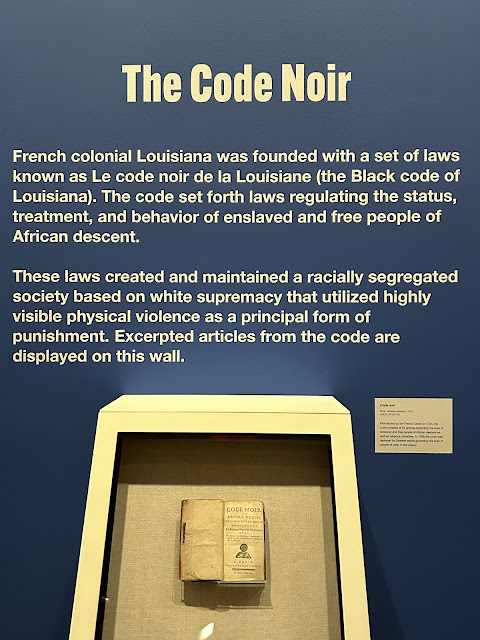Besides my Coolinary experiences for the week, I also had the opportunity to visit some new museum exhibits. There was a reciprocity of museums. Hopefully many took advantage of visiting as many as possible. The thought-provoking exhibit on incarceration was powerful and heartwrenching as the the stench of truth made even a Snow Ball in the August heat less desirable.
This truth should never be taken lightly. The verbiage below is not mine but the exhibit's.
"Since the founding of Louisiana and New Orleans by French colonists, people in power have held others captive as a means of punishment, control, and exploitation. Black Louisianians in particular have been subjugated and forced to labor against their will through chattel slavery and systems of incarceration for more than 300 years.
In the colonial years (1682-1803), the government created systems of enslavement and social caste based on race through legislation, policing, imprisonment, and physical violence. These systems matured during the first half of the 19th century, when New Orleans became the primary hub of the domestic slave trade.
The United States Congress abolished most forms of slavery when it passed the 13th Amendment to the Constitution in 1865, but it created an exception for the enslavement of people convicted of a crime. This allowed Louisiana to continue a practice begun in 1844 of leasing incarcerated individuals to private citizens and entities for labor on plantations and public-infrastructure projects. Many were forced to work at a place known as Angola, a property that included several plantations previously owned by one of the largest slave traders in the country. At the turn of the 20th century, the site became the Louisiana State Penitentiary, where to this day incarcerated people are forced to labor for little or no pay in the same fields once worked by enslaved people.
State laws established at the dawn of Jim Crow combined with the "tough-on-crime" policies of more recent decades caused Louisiana's incarcerated population to explode in the late 20th century. Tougher sentencing has led to more people serving life without parole - meaning more people aging and dying behind bars.
Louisiana's notoriety as a world leader in incarceration today is the consequence of decisions made by people in power here for more than three centuries. As the human and financial costs continue to mount, even in the face of declining crime rates, Louisiana itself is held captive by this history."
What I want to know is how can we in this century let this system continue?
Shame on us.



No comments:
Post a Comment